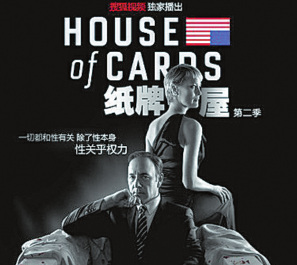
CHINA DAILY
Season 2 of House of Cards draws about 9 million Chinese viewers.
Season 2 of House of Cards, which debuted simultaneously in China and its home country, is creating waves in the form of discussions about US politics, among other things. The Chinese streaming platform Sohu.com, which claims to have garnered 9 million viewers for the show, is racketing up its promotional campaign.
But compared with domestic or South Korean soap operas, this melodrama of American-style deceit and dense plotting is perceived as a niche product on the high-end of viewership, thus bringing in an audience of quality rather than quantity.
(Full disclosure: I was invited by Charles Zhang, CEO of Sohu, to participate in the Feb 18 press conference as a special guest offering my interpretation on the show.)
The popularity of House of Cards in China is rooted in the Chinese penchant for backroom political maneuvering. Palace drama has long been a favorite for both couch potatoes and conspiracy theorists.
Sure, The West Wing has some of that, too, but the Aaron Sorkin drama was too gentlemanly whereas this Kevin Spacey series dovetails perfectly with China's own Zhenhuan, a lengthy costume drama and one of the highest-rated and acclaimed shows in recent years, which was later edited down to six episodes for HBO.
As a matter of fact, it has been nicknamed "America's Zhenhuan" by some TV pundits.
For good or bad, it has been serving as a kind of primer for US politics—at least in the minds of a significant share of the Chinese audience. Herein lies another secret for its success on this side of the Pacific.
People across the ideological spectrum are able to find something to support their own beliefs: Those who hate the United States can have a field day, saying democracy, American style, is a sham fraught with wheeling and dealing no less dirty than China's feudal system; those who love the US will counter that the limited power of every politician, no matter how high his or her position, works well in preventing the evil side of human nature from totally corrupting the system.
If you flip the coin, however, it can also be argued that the show busts preconceptions for all those whose rigid views of the US are mostly derived from abstract theories. The game in Washington DC is far from the idealist's paradise of everybody working for the people. But the biggest revelation could be: The US government does not function as a single brain when dealing with a variety of issues. Even when the voice is unified, what is presented to the world is often the shifting results of wheeling and dealing among several political forces.
Season 2 holds special allure because the plot deals with China. When the US president, the secretary of state and other politicians float their proposals for China policy, we see the decision-making process as a deliberation of pros and cons and the trading of various interests, rather than a single person plucking the light bulb of a great idea from his head. This could be taken for granted by Americans, but here it could be startling and revealing.
The learning curve seems to be going both ways. China, as a narrative element of newsworthiness, is also no longer one big enterprise of mystery. There are different interests competing for favors and projects. (Spoiler: The person who claims to represent the Chinese government turns out to be one with his own agenda, possibly a sign of US television showmen's growing knowledge of the complexity of Chinese politics.)
For those who rely solely on highly dramatized accounts, such as House of Cards, for political insight, the perception and understanding indisputably will be warped. Still, it will be less ludicrous than basing every opinion of a vast and complex political structure on some outdated doctrine.
We recommend:
